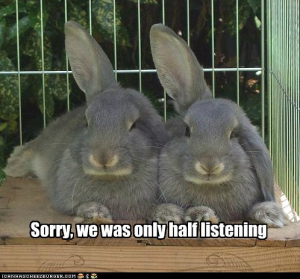The blog comes to you today courtesy of my colleague and audition tour partner in crime Lee Anne Myslewski.
 OK. For all of you who sing, or tune into the blog and say “I think that the tour sounds like so much fun!” I will agree with you – it is fun – but here’s the unvarnished truth… It’s not totally a walk in the park.
OK. For all of you who sing, or tune into the blog and say “I think that the tour sounds like so much fun!” I will agree with you – it is fun – but here’s the unvarnished truth… It’s not totally a walk in the park.
Exhibit A. I’m in my hotel room, fully pajama-ed and close to horizontal at 8:30pm on a Saturday night. A Saturday night in Chicago, no less, where there are endless numbers of interesting things to do and see and hear, and a good number of people that I could rouse to accompany me to do/see/hear one of the aforementioned interesting things.
Exhibit B. While I sit here in my hotel room? I am sitting in silence. No TV. No iTunes. No Pandora or Spotify or YouTube or Netflix or Hulu.
Exhibit C. I phoned my husband, and then turned the phone off. Because?
Because my ears are full.
We talk often about society being visual – that we get our information and entertainment from our eyes moreso than our ears. But, over the last several weeks the ratio of eye to ear has shifted considerably so that my ears are doing the heavy lifting.
Seth Horowitz, an auditory neuroscientist at Brown, wrote a piece for the New York Times about listening. He discriminates between hearing – which is passive – and listening, which requires attention and focus. He writes:
But when you actually pay attention to something you’re listening to, whether it is your favorite song or the cat meowing at dinnertime, a separate “top-down pathway comes into play. Here, the signals are conveyed through a dorsal pathway in your cortex, part of the brain that does more computation, which lets you actively focus on what you’re hearing and tune out sights and sounds that aren’t as immediately important.
In some ways it makes perfect sense that, at this point in the audition tour, I barely have two brain cells to rub together. We’ve been concentrating so hard: to really listen to the voice, to take into account the positives and negatives of each audition space and weigh them against what we know of our own house, to comb past our own personal likes and biases to find the best singers, rather than just the ones that hit our own sweet spots. And we’re doing most of it with our ears.
Of the panel, I tend to be the one that gets sucked into a strong dramatic presentation most easily. (If you’re a good actor, I will immediately gravitate to your performance.) So those particular performers I can’t afford to watch as much – I have to really listen to make sure that the vocalism is on an equal par with the dramatic skills, and that the overall package is competitive with singers from previous cities. (Conversely, if your acting isn’t as strong I have to kick my ears up even more, to make sure I’m not penalizing your glorious voice because you’ve never figured out that dramatic piece.)
According to Dr. Horowitz’s article, we’re actually solving cognitive puzzles on two different levels: the first is in the act of actively listening for 7+ hours a day, trying to parse out the vocal color/size/competitiveness. The second is in figuring out which people rise to the top, and then juggling the repertoire to see how we might be able to use them and in what combinations.
We have two days left on the tour, and then decisions will need to be made… but this evening I’ll be giving my ears a break, listening to the heating vent and the hum of the EL several floors below.
(If you need me, probably best to email or text.)
(P.S. The image above at left? Just kidding, of course:))
[…] the last few weeks have robbed me of brain cells. I wrote a little bit here about the struggle I’m having with listening and, well, doing anything else. Posting to […]
[…] be a busy autumn: in addition to our annual audition tour, I’ll be participating in a local leadership program. (Can’t take the student out of […]